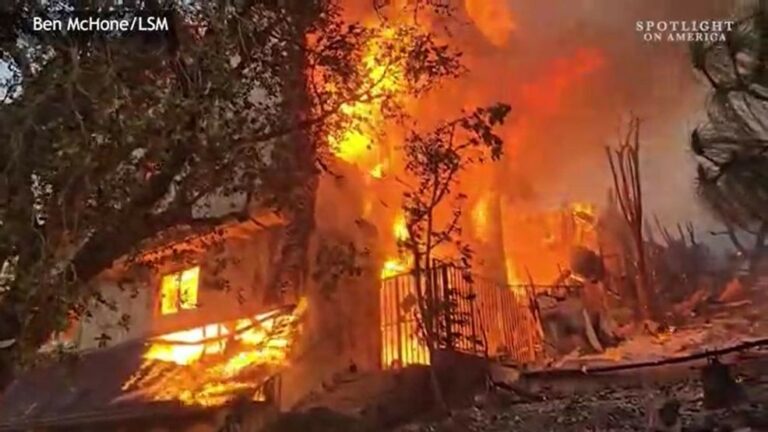Home Insurance Crisis Deepens Across America
A troubling trend is spreading across the United States, threatening the American dream for many homeowners. Skyrocketing home insurance rates and a record number of policy non-renewals are leaving homeowners vulnerable, according to a recent investigation by Spotlight on America.
The frequency of natural disasters, such as wildfires in California and hurricanes in the Southeast, is a significant factor driving the crisis. “You’re seeing insurance companies go bankrupt,” U.S. Senator Sheldon Whitehouse warned. “You’re seeing insurance companies abandon states, you’re seeing insurance companies abandon long-standing customers. You’re seeing prices quadruple.”
Home insurance rates have spiked nationwide, with 33 states seeing double-digit rate increases in 2024. Nebraska experienced the highest increase at 22.7%. Since 2019, Colorado, Utah, Nebraska, Arizona, Minnesota, and Iowa have seen cumulative increases of over 65%.
Mark Friedlander, Senior Director of Media Relations for the Insurance Information Institute, explained that states not traditionally considered high-risk are seeing increases due to other natural disasters, such as severe convective storms and wildfires. He also cited litigation over claims and rising rebuilding costs as contributing factors.
In Florida, the sharp spike in rates drove Tampa area resident Larry Bendik to cancel his policy and go self-insured. “Even if something happened, I would still get stuck with a big bill anyway,” Bendik said.
A 2023 survey from the Insurance Information Institute showed that 12% of homeowners didn’t have home insurance, more than double the 5% in 2019. Michael DeLong, an analyst with the Consumer Federation of America, cautioned that while some might consider dropping insurance due to high costs, “it’s still a very bad idea.”
Senator Whitehouse expressed concern that the growing crisis could destabilize the housing market nationwide. “We’re headed towards a pretty significant cascade from failed insurance markets to failed mortgage markets to crashed property values,” he said.
Veteran Tampa Bay real estate agent Vince Arcuri confirmed that escalating insurance rates and non-renewals are making it harder to sell homes. “People are not able to qualify for a mortgage because of the skyrocketing insurance,” Arcuri said.
Homeowners are advised to bundle home and auto insurance, take risk mitigation steps, and shop around for coverage to potentially lower premiums.
Army Doctor Sentenced for Sexual Abuse of Patients
In a separate but equally disturbing case, a trusted Army doctor has been sentenced to more than 13 years in prison after pleading guilty to sexually abusing dozens of his patients at Joint Base Lewis-McChord. Michael Stockin, who admitted to 41 counts of abuse, received a maximum sentence of 164 months in prison and was dismissed from the Army.
Victims of Stockin’s abuse shared their experiences of betrayal and anger, with one 15-year veteran stating, “It didn’t happen just because I was weak. It happened because he set it up in intentionally ambiguous ways to take advantage of people who are trained to trust people in positions of authority.”
Attorney Ryan Guilds, representing seven of Stockin’s victims, expressed concern over the military’s handling of the case, noting that only one out of the 41 victims had a victim advocate. “That’s unacceptable,” Guilds said.
U.S. Supreme Court to Consider Gun Trafficking Case Against American Gun Makers
The U.S. Supreme Court is considering a groundbreaking legal case that pits Mexico against a group of American gun makers and distributors. The plaintiffs accuse these companies of knowingly allowing their weapons to flow into the hands of cartels.
By some government estimates, hundreds of thousands of guns flow south from the U.S. each year into Mexico, in what is known as the ‘Iron River.’ Attorney Jonathan Lowy, representing Mexico in the case, is seeking $10 billion from 11 American gun makers and distributors.
The case alleges that the guns are trafficked into Mexico and that the defendants make “deliberate design, marketing, and distribution” choices to grow that market. They are accused of selling to straw buyers who purchase extremely powerful weapons with cash repeatedly.
The American gun industry argues that straw buyers should be punished, not the gun makers, citing the Protection of Lawful Commerce in Arms Act (PLCAA) that protects firearms manufacturers and dealers from being held liable when crimes have been committed with their products.
The high court is expected to make a ruling in June.


